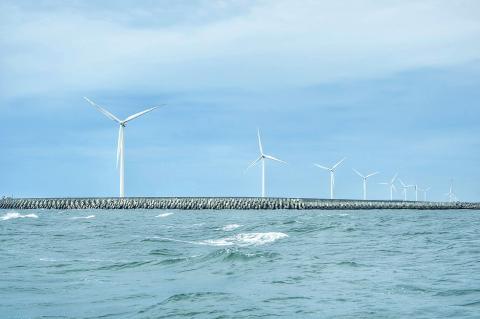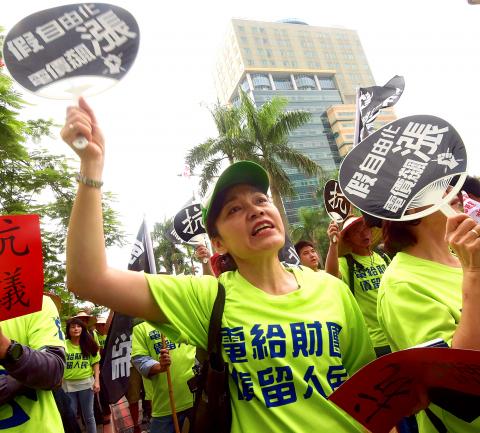Academics yesterday criticized the Executive Yuan’s policy stance on a draft amendment to the Electricity Act (電業法) as a “great” setback for the government’s policy to liberalize the nation’s electricity industry.
“The government’s stance represents a policy U-turn, because Taipower [Taiwan Power Co (台電)] would still monopolize the industry,” said Kimmie Wang (王京明), research fellow at the Chung-Hua Institution for Economic Research’s (中華經濟研究院) Center for Energy and Environmental Research.
The proposed amendment would make no difference to liberalizing the industry, because non-renewable energy firms are still not allowed to enter the market to compete with Taipower, he said.

Photo: Courtesy of Taiwan Power Co
Wang’s criticism came after the Executive Yuan on Thursday outlined the draft amendment.
Cabinet spokesman Hsu Kuo-yung (徐國勇) said the draft would focus on developing the “green” energy industry in its first phase as part of government efforts to reduce thermal electricity generation and carbon emissions, and to improve environmental protection.
Hsu said “renewable” energy companies and power distribution firms would be allowed to sell electricity directly to enterprises through Taipower’s distribution network or by setting up their own distribution networks.

Photo: Huang Yao-cheng, Taipei Times
In the second phase, Taipower would be split into two companies — a power generation company and an electrical grid company — six years after the amendment takes effect, as part of efforts to liberalize the industry, Hsu said.
Private power generators still cannot sell their electricity to households, he said.
National Taiwan University Atmospheric Science professor Gloria Hsu (徐光蓉) said she is very disappointed that Taipower is likely to retain its monopoly in the industry.
As the Electricity Act has not been amended for nearly two decades, the government may fall short of liberalizing the industry, she said.
“The proposed amendment has ended the possibility of developing a healthy electricity industry in the nation,” she said by telephone.
Taiwan has used a feed-in tariff (FIT) program for several years in a bid to accelerate investment in “renewable” technologies by offering favorable prices to “green” energy producers.
However, if the government does not plan to initiate a sunset clause to the FIT program, Wang said many “renewable” energy producers would continue with the scheme to avoid additional costs, such as erecting power lines.
Bureau of Energy Director-General Lin Chuan-neng (林全能) said he does not think the policy is a setback for the government.
He said that the amendment is not exactly the same version the bureau drafted a few months ago, but it would still change the industry and provide stable electricity supplies.
Lin said giving the “renewable” energy industry more flexibility is a big step for the government and separating Taipower into two companies in six years would also pave the way toward liberalizing the industry.
“If the government pushes the liberalization too hard it will make it more difficult to reform the industry,” Lin said.
The bureau is to send a final version of the draft amendment to the Executive Yuan next week for approval, before submitting it to the Legislative Yuan for further review, it said.

AGING: As of last month, people aged 65 or older accounted for 20.06 percent of the total population and the number of couples who got married fell by 18,685 from 2024 Taiwan has surpassed South Korea as the country least willing to have children, with an annual crude birthrate of 4.62 per 1,000 people, Ministry of the Interior data showed yesterday. The nation was previously ranked the second-lowest country in terms of total fertility rate, or the average number of children a woman has in her lifetime. However, South Korea’s fertility rate began to recover from 2023, with total fertility rate rising from 0.72 and estimated to reach 0.82 to 0.85 by last year, and the crude birthrate projected at 6.7 per 1,000 people. Japan’s crude birthrate was projected to fall below six,

US President Donald Trump in an interview with the New York Times published on Thursday said that “it’s up to” Chinese President Xi Jinping (習近平) what China does on Taiwan, but that he would be “very unhappy” with a change in the “status quo.” “He [Xi] considers it to be a part of China, and that’s up to him what he’s going to be doing, but I’ve expressed to him that I would be very unhappy if he did that, and I don’t think he’ll do that. I hope he doesn’t do that,” Trump said. Trump made the comments in the context

SELF-DEFENSE: Tokyo has accelerated its spending goal and its defense minister said the nation needs to discuss whether it should develop nuclear-powered submarines China is ramping up objections to what it sees as Japan’s desire to acquire nuclear weapons, despite Tokyo’s longstanding renunciation of such arms, deepening another fissure in the two neighbors’ increasingly tense ties. In what appears to be a concerted effort, China’s foreign and defense ministries issued statements on Thursday condemning alleged remilitarism efforts by Tokyo. The remarks came as two of the country’s top think tanks jointly issued a 29-page report framing actions by “right-wing forces” in Japan as posing a “serious threat” to world peace. While that report did not define “right-wing forces,” the Chinese Ministry of Foreign Affairs was

PREPAREDNESS: Given the difficulty of importing ammunition during wartime, the Ministry of National Defense said it would prioritize ‘coproduction’ partnerships A newly formed unit of the Marine Corps tasked with land-based security operations has recently replaced its aging, domestically produced rifles with more advanced, US-made M4A1 rifles, a source said yesterday. The unnamed source familiar with the matter said the First Security Battalion of the Marine Corps’ Air Defense and Base Guard Group has replaced its older T65K2 rifles, which have been in service since the late 1980s, with the newly received M4A1s. The source did not say exactly when the upgrade took place or how many M4A1s were issued to the battalion. The confirmation came after Chinese-language media reported